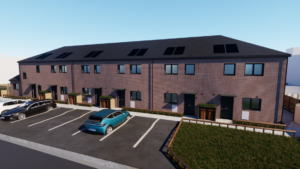Utopias that work: How to create tomorrow’s garden city
Winner of the Wolfson Economics Prize for their vision of a 21st century garden city, Urbed’s Nicholas Falk talks through his winning entry and urges new garden cities to capture the ‘common wealth’ for local good
A conference in Letchworth Garden City, like the event on Common Good Placemaking held in early September, inevitably creates a positive feeling that through common or shared efforts anything is possible. Yet the reality of Letchworth, and subsequent failed attempts, is that good intentions are not enough to create a utopia in a market driven world.
Ebenezer Howard’s great inventions were not leafy lanes; indeed the very name garden city was derived from his experience in Chicago, and not used for the first edition of his thought-changing book Tomorrow: A Peaceful Path to Urban Reform. Howard focused on tapping the ‘unearned increment’, the value created when development takes place, and using it to support high quality infrastructure.
It is the ‘social city’ of new settlements, connected together and with a central city, that should inspire our imagination. Yet that concept, strangely, is not covered in the otherwise excellent exhibition at the Letchworth Museum that has taken over Barry Parker’s old drawing office.
So, with so much stress on tackling the ‘housing crisis’ what lessons can we draw from Garden Cities, and in particular the Wolfson 2014 Economics Prize, which was won by us at Urbed, with Shelter as a runner-up.
New challenges for the 21st century
Tomorrow’s cities not only have to be affordable in a world where few earn enough to make a deposit on a house, but also to cut carbon emissions, and create a sense of community. Letchworth was built at a time when the man was the breadwinner, working locally, and when energy was delivered by the coalman. Various religions brought people together; alcohol was banned, and people made their own entertainment. The motor car was hardly practical for most people’s needs.
It is the ‘social city’ of new settlements, connected together
and with a central city, that should inspire our imagination.
Today in the greater south east, stretching out from London to Oxford or Cambridge and down to Brighton, there is vast pool of talent, and many potential educational and employment opportunities, especially in historic market and country towns and in the heart of London. It is this ‘common wealth’ that draws people from all over the world, and in the process makes getting on the housing ladder ever harder.
At the same time, while the blackened air in cities no longer drives people away, and places like Kings Cross have become the most desirable spots to locate, the underlying inequalities that Danny Dorling stresses will inevitably spark off further riots and atrocities if left unattended. As well as improving the utilisation of our housing stock, we have to find ways of doubling housing output and locating them where there is easy access to jobs and services, and this means taking much of the risk out of development.
Uxcester Garden City: visionary, valued, viable
In entering for the Wolfson essay competition David Rudlin and I were able to make the most of the work we have done at Urbed on sustainable urban neighbourhoods for over twenty years. As leading advocates of building higher density neighbourhoods in locations like Hulme or Brighton, we had also started to consider the challenges of places on the ‘edge’, like many post-war council estates. I had also had the advantage of leading study tours to many now acclaimed places on the continent such as Freiburg and the many Dutch new communities, which featured in a book I helped the late Sir Peter Hall produce.
The Wolfson prize, which drew 279 entries, asked for proposals that met what I call the three Vs: how to build a new settlement that is visionary, valued and viable. Thus the proposal had to be popular with both the new residents and the existing community, and it must be undertaken without public subsidy.
While most entrants focussed on using land with low value, our submission was unusual in proposing that a new city could only be created by ‘grafting it on to good root-stock’. It was impossible to fund all the elements people today expect if you start from scratch. Even good transport links, as in Ebsfleet in Kent, are not enough if you want more than a series of suburban housing estates.
While we started with the example of York, suitably disguised, we ended up taking Oxford as our test case (and identified some 40 other possible locations). Fortunately I had spent the previous year working with Oxford Civic Society and others to examine how the pressures on Oxford could best be met.
Through focus groups, we found that not only was there a general feeling among professionals that concentrating growth in a few planned settlements would produce better results than spreading it around, but we also identified ways in which a ‘social contract’ might be negotiated. Thus in Oxford, not only is there a need to tackle congestion by attracting people away from their cars, but flooding is a real problem.
By taking a ‘careful bite out of the green belt rather than nibbling at the edges’, substantial capital values can be generated. These would fund a new tram system and a series of country parks. A Garden City Foundation would offer serviced sites with planning permission to a much wider range of builders, including those commissioning their own homes or co-housing groups, and ensure the common parts were maintained well. All this could be done without intruding into the flood plain or areas of beauty or scientific interest.
New investment and leadership for better balanced communities
The unresolved challenge is how to avoid speculation. Here we propose adopting the German system of ‘freezing land values’ in areas identified for planned growth. Of course much needs to be done to rebuild capacity, and what we call the ABC of leadership – ambition, brokerage and continuity – which emerge from a series of case studies of successful projects.
In a recent pamphlet I have gone further, proposing a Municipal Investment Corporation to channel private finance, raised through ‘retail bonds’ into the infrastructure needed to build housing. Such a revolution could not only create better balanced communities, but could also be used to rebuild our economy away from its over-dependence on finance and retailing. In short ‘Garden Cities for Tomorrow’ could be the rallying cry for creating utopias that work, and also for protecting the many villages now threatened by urban sprawl.


















The garden city – a stultifying, depressing but comfortable, car-free suburban zombie-land
http://theviewfromcullingworth.blogspot.co.uk/2014/09/the-garden-city-stultifying-depressing.html
I disagree with Simon’s take, however I think we need to be on our guard to ensure that garden cities don’t go down that path. Which is why I feel strongly that garden cities need a strong definition – a social definition – to ensure that they don’t become utopian gated communities. Instead they need to be open and part of the wider community. These principles need to be in place at the start and I liked Urbed’s idea of a social contract. But that social contract needs to extend beyond the settlement itself.
This is the lesson that they learnt in Vermont in the USA where they have established CLT.
I have been trying to get interest away from the south east and greenfield per se. The garden city movement seems to accept the neo-liberal market driven economy that has created an economically distorted low wage economy driven by financial services based in and around London. The effect of current thinking would be to signal that this draining and sucking in of talent to the greater south east is set to continue. Except with a more humane residential response.